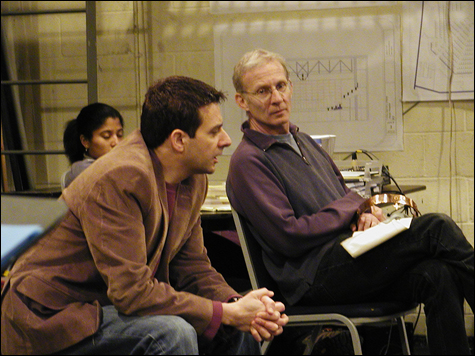Trinity seeks the truth in the lies of Richard III
By BILL RODRIGUEZ | January 23, 2008

LOOKING BELOW THE SURFACE: Moriarty and McEleney. |
Talk about a bad rap. According to Shakespeare, whose Richard III will be strutting and fretting on the Trinity Repertory Company stage from January 25 to March 2, the eponymous king was the foulest caitiff since Grendel was a pup. One after another, he mercilessly eliminated rivals and obstacles to the throne, keeping a solicitous smile on his face until he reached his goal.
No matter that, as director Kevin Moriarty notes, historians now suggest that he was a pleasant enough bloke, whom Henry VII and his followers libeled for their own purposes. Still, Brian McEleney, who is playing Richard — with a limp but not a hunchback — has his work cut out for him in interesting audiences in such a villain.
“I’m trying to make him as funny and witty and sharp as I possibly can, and as we know, lying takes its toll,” McEleney says.
“And that’s really the tragedy, not just that he murders a lot of people but that he gets caught up, gets sucked down into the maelstrom of his own lies,” he continues, sinking lower in his chair as he makes a whirlpool motion with his hands.
They are speaking in the archives room at Trinity, discussing the character and the play.
The director points out that both Richard IIIs, play and king, are all about performance. Speaking as Richard, he says, “ ‘I’m going to do horrible things and convince everybody that I am the nicest person in the world.’ And that’s what’s the fun of the character. [Shakespeare] doesn’t write a villain per se, he writes a liar, an actor.”
McEleney has found current political life informing his portrayal. “One of the things this play makes me reflect upon is how susceptible we are to charisma, how susceptible we as a people, certainly the media, are to somebody having a charming personality. Poor Al Gore was pilloried because he was wooden or he sighed. They voted for George Bush because, supposedly, they all wanted to have a beer with him.”
He adds, “We fall under the sway of charm much more than is healthy for us.”
But the play isn’t simply about the pathological personality of a supposedly unconscionable 15th-century king. Moriarty observes that Shakespeare was cleverly characterizing ruthless government in general as well as Richard III specifically. In the early 1590s, when he wrote this, perhaps the most popular of his plays well into the next century, Elizabethans were as fascinated as they were appalled by Machiavelli’s treatise The Prince, which advised immoral means if necessary for moral ends.
“That is another thing that’s truly remarkable about the play,” Moriarty says. “The state flourishes and succeeds as Richard is able to do whatever it takes as justifying means, until the point that you built an entire government upon blood and lies and fakery and media spin and false religion. At which point the government essentially, and literally the nation, suffers a mental breakdown, as the whole system just implodes in on itself — which is what a civil war is.”
Shakespeare’s audiences, from groundlings to royalty in the loges, thoroughly knew the history being depicted, so the playwright had no need to explain the War of the Roses, which concludes with the final battle scene of this play, ending Richard’s House of York and beginning the reign of the House of Lancaster. Director Moriarty came up with a clever device to orient us non-history majors at the beginning of the play.
“What we’re doing is taking several scenes from Henry VI, Part I, which is the immediate prequel to this play, written by Shakespeare with the same characters,” he explains. “We are taking several scenes from that and starting our play with those scenes.”
He compares this to those helpful summaries before episodes of Lost and Heroes, two of his favorite shows, which remind us of what came before.
Richard III was only the third or fourth play that Shakespeare wrote, at least two of the three parts of Henry VI preceding it. At the time, it was the longest play in the English language, to be exceeded a few years later by Hamlet. But it remains the only play that Shakespeare wrote entirely in blank verse.
The Trinity Rep production is paring down what would be a nearly four-hour work into 2-1/2 hours. The hope is that less, if clearly focused, will be more.
 Related
Related:
 Topics
Topics:
Theater
, William Shakespeare
, Kevin Moriarty
, RICHARD III
, More  , William Shakespeare
, Kevin Moriarty
, RICHARD III
, Theater
, Theatrical Plays
, Entertainment
, Performing Arts
, George W. Bush
, Al Gore
, Niccolo Machiavelli
, Less
, William Shakespeare
, Kevin Moriarty
, RICHARD III
, Theater
, Theatrical Plays
, Entertainment
, Performing Arts
, George W. Bush
, Al Gore
, Niccolo Machiavelli
, Less 